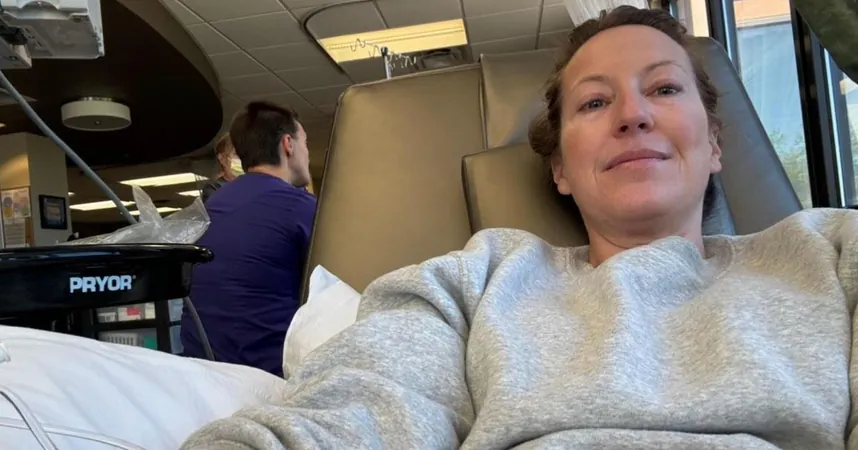
How I Went from 37 to 57 in Just Two Weeks: My Turbulent Journey Through Cancer and Menopause
2025-01-07
Author: Chun
Entering my first hot yoga class in over a decade was a bold decision, perhaps too bold. As I stretched and posed among the sea of flexible bodies, an intense wave of heat surged from my chest, leaving me breathless and dizzy. I hit the mat in child’s pose, feeling the sweat trickle down my forehead, desperate for relief. The instructor’s voice cut through the air, urging us toward personal growth, but all I could think was that I needed to escape.
When I finally rose to attempt warrior two, my body protested dramatically. I was hit with a massive hot flash, forcing me to retreat to the bathroom, where I splashed my face with icy water. Even after that ordeal, I felt drained and dehydrated for days, despite my efforts to rehydrate with electrolytes.
Reflecting on my decision to attend hot yoga, I realized it was a reckless venture for someone like me, suffering from severe hot flashes after being thrust into premature menopause at 37 due to breast cancer treatments. An experience that began so innocuously—a lump discovered above my right breast—spiraled into a life-altering diagnosis. I had lost my mother to a rare and aggressive cancer two years prior, which taught me how crucial early detection was. So, when I felt that lump, panic set in, and I knew I had to act fast.
After undergoing a mammogram and biopsy, my diagnosis confirmed early-onset, estrogen receptor positive (ER+) breast cancer, thankfully sparing me from chemotherapy. However, that relief was short-lived. The treatment required a unilateral mastectomy followed by ten years of adjuvant therapy, including Letrozole to drop my estrogen levels and quarterly Lupron injections to suppress my ovaries. My oncologist bluntly warned me that these treatments would push me into menopause.
Not fully grasping the ramifications, I soon became overwhelmed. Within weeks, I faced a barrage of symptoms: insomnia, relentless hot flashes, and a painful condition known as Genitourinary Syndrome of Menopause (GSM), which plagued me with urinary tract infections and disrupted intimacy. It felt like I had abruptly aged twenty years, thrown into a phase of life that left me reeling.
With every passing day, I wrestled with common menopausal complaints that left me feeling alien in my own body. My patience wore thin with my children, and I felt isolated, unable to confide in my peers who had yet to experience similar challenges.
Seeking solace during a visit to my primary care physician, I was advised to explore homeopathic remedies. A deep dive into online searches soon turned into an avalanche of wellness products and remedies, each claiming to combat my newfound woes. Although I tried a variety of supplements and vitamins—some of which provided minimal relief—the barrage of menopause-centric ads in my social media feeds reminded me of the lucrative "$24.4 billion menopause industry" that had emerged.
Despite experiencing a paradigm shift in how society discusses menopause—thanks to icons like Drew Barrymore and Gayle King—there persists a concerning trend promoting the idea that aging should be corrected rather than accepted. I fell into the trap of believing that by securing the right products, I could wrestle control over aging, viewing it almost as an insult to be endured.
However, I've grown to understand that menopause isn't merely about battling hot flashes and skin dryness; it represents a significant shift in one's health and well-being. Increased awareness of medical risks linked to menopause, such as dementia and osteoporosis, has led me to prioritize self-care in novel ways. Exercise routines are tailored not for mere weight loss but for maintaining bone strength and mobility.
This journey has also forced me to confront my personal relationships and the changing dynamics they entail. I’ve come to appreciate the wisdom that aging presents—realizing that I don’t need to chase youth to have a fulfilling life. Instead, I’ve learned to embrace my experiences fully. Self-compassion has become a guiding principle for me, recognizing that I don’t always have to perform at peak ability; often, just showing up is enough.
My initial cancer diagnosis pushed me to truly confront the concept of time. As I grappled with the realities of mortality, I also rediscovered the value of existence—my family, friendships, and personal fulfillment. The confrontation with life’s fragility ignited a desire not just to survive but to thrive.
Today, I see beyond the superficial signs of aging. Instead, I celebrate surviving cancer, the lessons learned, and the knowledge that menopause is just a chapter in our rich, multifaceted lives. Ultimately, it’s not about reclaiming youth, but embracing wisdom and understanding, ensuring that we find meaning in every phase of life.



 Brasil (PT)
Brasil (PT)
 Canada (EN)
Canada (EN)
 Chile (ES)
Chile (ES)
 Česko (CS)
Česko (CS)
 대한민국 (KO)
대한민국 (KO)
 España (ES)
España (ES)
 France (FR)
France (FR)
 Hong Kong (EN)
Hong Kong (EN)
 Italia (IT)
Italia (IT)
 日本 (JA)
日本 (JA)
 Magyarország (HU)
Magyarország (HU)
 Norge (NO)
Norge (NO)
 Polska (PL)
Polska (PL)
 Schweiz (DE)
Schweiz (DE)
 Singapore (EN)
Singapore (EN)
 Sverige (SV)
Sverige (SV)
 Suomi (FI)
Suomi (FI)
 Türkiye (TR)
Türkiye (TR)
 الإمارات العربية المتحدة (AR)
الإمارات العربية المتحدة (AR)